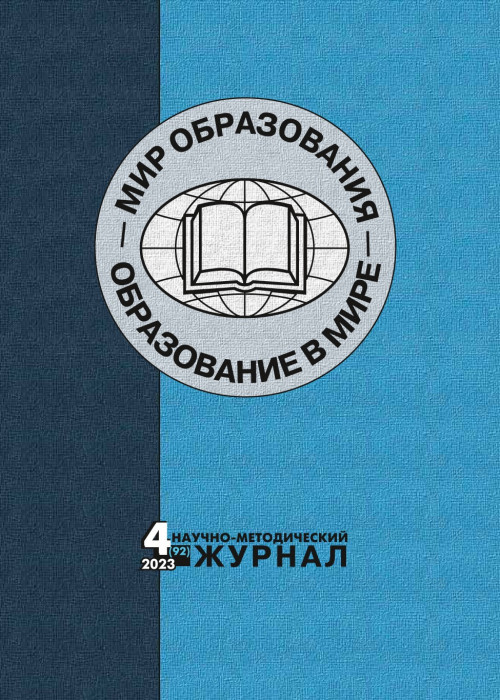Library
1. 15. Wagner T. The Global Achievement Gap: Why Even Our Best Schools Don’t Teach the New Survival Skills Our Children Need — And What We Can Do About It [Electronic resource] / T. Wagner. — Basic Books, 2008. — 321 p. — URL: <a href="https://" target="_blank">https://</a> b-ok.org/book/1084653/
2. 14. Voogt J. A comparative analysis of international frameworks for 21st century competences: Implications for national curriculum policies / J. Voogt, N. Pareja-Roblin // Journal of Curriculum Studies. — 2012. — Vol. 44 (3). — P. 299–321. — DOI: <a href="https://" target="_blank">https://</a>
3. 13. Solmi M. Age at onset of mental disorders worldwide: large-scale meta-analysis of 192 epidemiological studies / M. Solmi, J. Radua, M. Olivola // Mol Psychiatry. — 2022. — Vol. 27. — P. 281–295. — DOI: 10.1038/s41380-021-01161-7
4. 12. Odgers C. L. Annual Research Review: Adolescent mental health in the digital age: facts, fears, and future directions / C. L. Odgers, M. R. Jensen // J Child Psychol Psychiatr. — 2020. — Vol. 61. — P. 336–348. — DOI: 10.1111/jcpp.13190
5. 11. A meta-analysis of longitudinal peer influence effects in childhood and adolescence / M. Giletta, S. Choukas-Bradley, M. Maes et al. // Psychological Bulletin. — 2021. — Vol. 147 (7). — P. 719–747. — DOI: 10.1037/bul0000329
6. 10. Adolescents’ real-time social and affective experiences of online and face-to-face interactions / R. Achterhof, O. J. Kirtley, M. Schneider et al. // Computers in Human Behavior. — 2022. — Vol. 129. — P. 107159. — DOI: 10.1016/j.chb.2021.107159
7. 9. Age, period, and cohort trends in mood disorder indicators and suicide-related outcomes in a nationally representative dataset, 2005–2017 / J. M. Twenge, A. B. Cooper, T. E. Joiner et al. // Journal of Abnormal Psychology. — 2019. — DOI: 10.1037/abn000
8. Sidorenko V. F. Genezis proektnoi kul’tury / V. F. Sidorenko // Voprosy filosofii. — 1984. — № 10. — S. 86–99.
9. 8. Сидоренко В. Ф. Генезис проектной культуры / В. Ф. Сидоренко // Вопросы философии. — 1984. — № 10. — С. 86–99.
10. Sergeev A. G. Kompetentnost’ i kompetentsii: monografiya / A. G. Sergeev. — Vladimir: Izd-vo Vladim. gos. un-ta, 2010. — 107 s.
11. 7. Сергеев А. Г. Компетентность и компетенции: монография / А. Г. Сергеев. — Владимир: Изд-во Владим. гос. ун-та, 2010. — 107 с.
12. Rozov N. S. Filosofiya gumanitarnogo obrazovaniya: Tsennostnye osnovaniya i kontseptsiya bazovogo gumanitarnogo obrazovaniya v vysshei shkole / N. S. Rozov. — Moskva, 1993.
13. 6. Розов Н. С. Философия гуманитарного образования: Ценностные основания и концепция базового гуманитарного образования в высшей школе / Н. С. Розов. — Москва, 1993.
14. Polat E. S. Metod proektov: istoriya i teoriya voprosa / E. S. Polat // Sovremennye pedagogicheskie i informatsionnye tekhnologii v sisteme obrazovaniya. — Moskva: Akademiya, 2010. — S. 193–200.
15. 5. Полат Е. С. Метод проектов: история и теория вопроса / Е. С. Полат // Современные педагогические и информационные технологии в системе образования. — Москва: Академия, 2010. — С. 193–200.
16. Mironenko E. S. Kompetentsii XXI veka vs obrazovanie XXI veka / E. S. Mironenko // Voprosy territorial’nogo razvitiya. — 2019. — Vyp. 2 (47). — S. 3–15.
17. 4. Мироненко Е. С. Компетенции XXI века vs образование XXI века / Е. С. Мироненко // Вопросы территориального развития. — 2019. — Вып. 2 (47). — С. 3–15.
18. Gal’skova N. D. Teoriya obucheniya inostrannym yazykam. Lingvodidaktika / N. D. Gal’skova, N. I. Gez. — Moskva: Akademiya, 2009.
19. 3. Гальскова Н. Д. Теория обучения иностранным языкам. Лингводидактика / Н. Д. Гальскова, Н. И. Гез. — Москва: Академия, 2009.
20. Ashcheulova K. A. Proektnaya deyatel’nost’ kak uslovie formirovaniya kommunikativnykh kompetentsii obuchayushchikhsya / K. A. Ashcheulova // Aktual’nye problemy razvitiya obrazovaniya na sovremennom etape : materialy simpoziuma v ramkakh XVI (XLVIII) Mezh
21. 2. Ащеулова К. А. Проектная деятельность как условие формирования коммуникативных компетенций обучающихся / К. А. Ащеулова // Актуальные проблемы развития образования на современном этапе: материалы симпозиума в рамках XVI (XLVIII) Междунар. науч. конф. с
22. Amirkhanova S. V. Stanovlenie identichnosti molodezhi v sovremennom rossiiskom obshchestve riska : dis. ... kand. sotsiol. nauk: 22.00.06 / S. V. Amirkhanova. — Kazan’, 2009. — 173 s.
23. 1. Амирханова С. В. Становление идентичности молодежи в современном российском обществе риска: дис. ... канд. социол. наук: 22.00.06 / С. В. Амирханова. — Казань, 2009. — 173 с.
